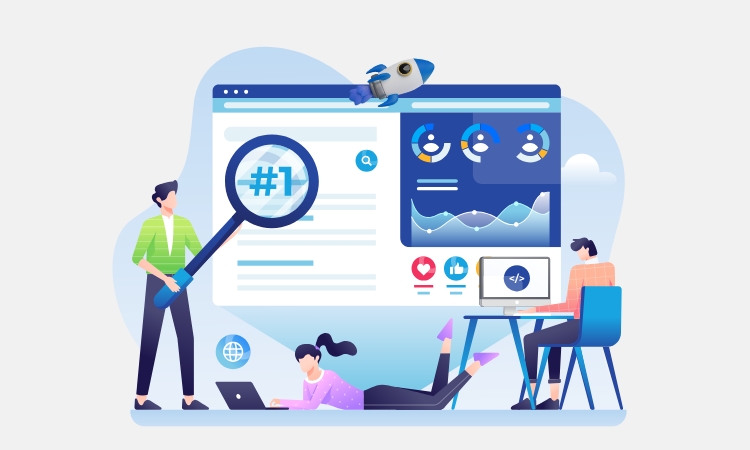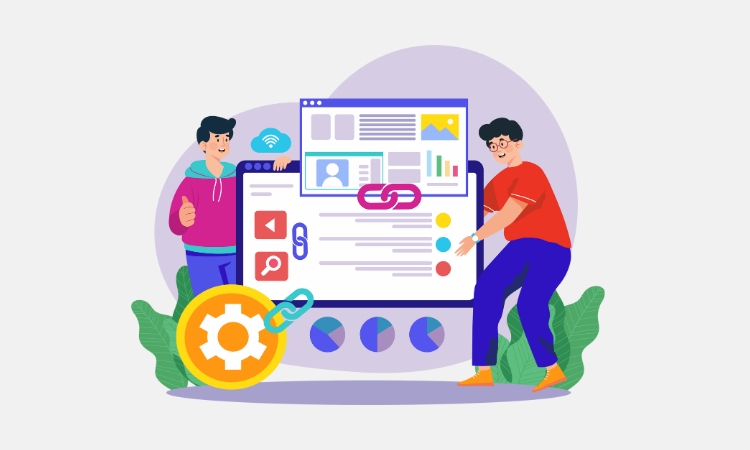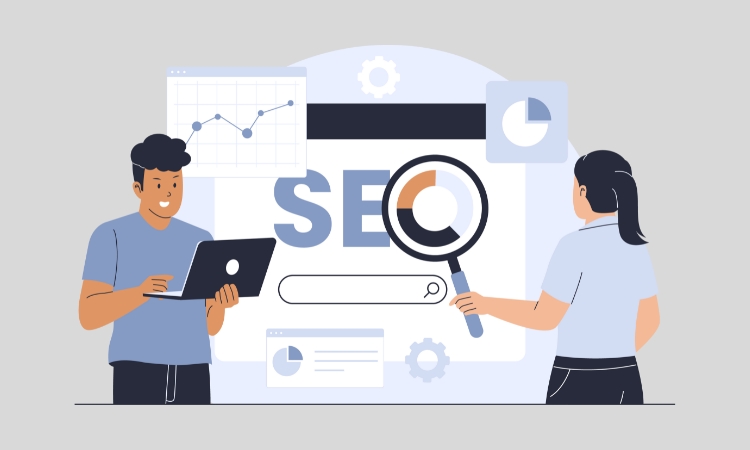The world of digital marketing is incomplete without SEO. Enterprise companies also require SEO for their online growth; their SEO strategies are large-scale and for businesses whose websites contain thousands of web pages.
Just like other companies, enterprises also require consistency and which helps to maintain their relevance in the market. It is reported that 55% of big companies spend over $20,000 monthly on SEO. This blog focuses on how enterprise SEO helps large organizations to rank higher on the search engine results pages.
What is Enterprise SEO
Enterprise SEO is the process of improving the search engine visibility of very large websites, like big online stores, corporate sites, or news portals, so more people can find them on Google. Unlike regular SEO, it focuses on handling thousands of pages at once, making sure the site is easy for search engines to crawl, the content is optimized, and the website ranks higher in search results.
Enterprise SEO requires scalable technical solutions, automations, cross-team collaboration, and an approach to a large amount of content, diverse business units, and multiple languages and regions.
This strategy uses a number of sophisticated tools and techniques to handle the company’s complex technical issues and website structure while maintaining the alignment of the company’s overall goals.
Why Enterprise SEO Matters for Large Organizations
The reasons why enterprise SEO is important for large organizations are that it is a strategic, scalable approach to optimizing complex website pages and increasing their visibility, user experience, and revenue. The factors that make enterprise SEO important for large organizations are
- Enhances Brand Trust and Recognition

Enterprise SEO strengthens brand trust by placing your website higher in search results, improving user experience, and increasing brand visibility. When your site ranks well, delivers smooth navigation, and appears in featured snippets, it signals authority, earns more clicks, and builds stronger connections with users.
- Boosts Website Traffic

By combining technical improvements, high-quality content creation, keyword optimization, and strategic link building, enterprise SEO drives sustainable organic traffic. It fixes performance issues, targets user intent, improves indexing, and earns authoritative backlinks—all contributing to higher visibility and steady traffic growth.
- Increases Revenue

Enterprise SEO attracts high-intent users, streamlines the customer journey, and improves conversions. With targeted content, a positive user experience, and data-backed insights, it boosts customer retention, supports repeat business, and identifies opportunities that maximize marketing ROI and overall revenue.
- Creates a Competitive Advantage

Optimizing large volumes of content for competitive keywords helps your organization outrank competitors and gain a stronger market presence. Higher rankings across multiple queries improve brand recognition, audience reach, engagement, and customer satisfaction—supported by AI insights that fine-tune your strategy.
- Enables Data-Driven Decision Making

Enterprise SEO offers deep insights into site performance, user behavior, and keyword trends, helping organizations make smarter decisions. By analyzing large-scale data, it identifies issues, reveals growth opportunities, guides budget allocation, tracks ROI, and ensures your website continually adapts to market changes.
Challenges in Enterprise SEO
Search engine optimization for enterprises is a large-scale organization that has thousands and millions of website pages, and it improves their unpaid search visibility on search results. The enterprise SEO is designed to handle the complexity, needs, and scale of large organizations.
This process is not easy at all. When you are performing enterprise SEO, you face certain challenges like
- Large site architecture & duplicate content issues.
Large site architecture and duplicate content cause significant challenges in enterprise SEO
Large site architecture
- See, large-scale enterprise websites have thousands of webpages. Their complex and fragmented architecture makes it hard to maintain a cohesive and user-friendly website.
- If your architecture is disorganized or inefficient, it leads the search engine crawlers to waste resources and crawl on low-quality and duplicate pages instead of identifying and indexing unique and fresh content.
- If the Link architecture is poorly constructed, then it can disrupt the flow of link equity. It weakens the ability of key pages and hinders their search engine ranking.
- In big enterprises, different departments work independently, which means the technical strategies will be inconsistent, leading to a poor site structure.
Duplicate content
- In case there is content that is available on multiple platforms, it splits the value of that page’s backlink and weakens the overall performance of your website.
- If the user finds the same content on multiple websites, it leads the user to be frustrated with the website and leading to higher bounce rates, lower engagement, and even signaling to Google that this site does not provide any real-life value.
- It confuses the search engines about which site is more authoritative and relevant. This drops the search engine visibility of all the involved pages.
- It wastes search engines’ crawling and resourcing budget on the same version of the content available on multiple pages.
- One problem that is common in large-scale enterprises is that when there is a minor difference in the URL, it causes the search engines to treat the pages as equals
- Difficulty in aligning multiple departments.
See, SEO initiative requires cross-functional collaboration, but it is obvious that different departments might have conflicting priorities, diverse key performance indicators, and lack the knowledge of SEO’s overall value. This misalignment causes many challenges in enterprise SEO, such as
- It is noticed in large-scale organizations that they have outdated and complex technology stacks and content management systems. These are not SEO friendly, and the IT department may be busy with other projects that are more important than this.
- When there are multiple departments, it is obvious that there will be multiple teams as well that do not share the same vision. Different teams may implement their own SEO practices. This inconsistency causes issues like duplicate content, poor internal linking structure, and under-optimized web pages.
- Departments in enterprises work separately, which causes communication gaps, leading to duplicate content, missed opportunities, and misunderstandings.
- The different departments of an enterprise do not share the same goals; they all have different key performance indicators, which slows down the SEO processes.
- The execution of SEO tasks slows down, as in order to implement it, you need permission from each stakeholder. This overall causes the enterprise to be unable to catch up with the market trends.
- Slow implementation due to bureaucracy
Slow implementation of SEO tactics in big enterprises is a challenge because it causes your business to lose its agility, leads to missed market opportunities, and overall revenue loss. It is a very common issue in large enterprises.
It causes issues like
- Necessary changes, such as changing the title tag, can take more than a week to get approved in large-scale enterprises.
- When your business is unable to keep pace with the dynamic nature of the market and search engine algorithms or any seasonal events, it gives your competitors an advantage.
- IT department teams do not consider SEO as their main priority, and delay the important technical fixes.
- When different departments operate in isolation, they lack communication. This leads to fragmented strategies and conflicting signals for search engines.
- If there is a delay by the IT department to fix the technical error, then it can turn out to be a loss of ranking, revenue, and conversion.
- If the tracking is not clear, then it will be difficult for the SEO teams to justify the need for more resources and quicker processes.
- If the SEO team is unable to implement a new SEO strategy, it can result in losing a competitive edge.
- Tracking performance across multiple regions and products
Tracking the SEO performance of your website across multiple pages and products is a challenge due to the sheer scale, leading to technical complexities, content localization, and cross-team coordination.
It means that you have to manage thousands of URLs for different markets and product lines, implementing and managing technical signals, to make sure that the content is not only translated but also adapted for a diverse audience.
What slows down the process is the lack of consistent processes and buy-in from multiple departments.
The key reason why tracking performance across multiple regions and products is a challenge is
- A large-scale enterprise has millions of URLS, which makes performance tracking of each page difficult.
- Search experience, search need, and search intent vary in the geographic market. Tracking includes keeping every webpage in check and monitoring every resourceful market.
- The performance data is often fragmented across different regions, product lines, and languages. Combining this data into one is a difficult task.
- Implementing technical SEO needs continuous monitoring, like site structure and tags. Across multiple pages of each region is a difficult task.
- For the success of your enterprise SEO, it is important that multiple teams align with one another, and if there is a conflict of interest between them, it causes unexpected changes, disrupting the performance tracking of the entire website.
- What most enterprises lack is a standardized and centralized report of performance across different business units, products, and regions for various stakeholders.
- If your website is under some sort of technical debt, then it will become difficult to track performance.
- Balancing automation with personalized optimization
Balancing automation with personalised optimization is a challenge because over-automation can result in the dilution of the brand’s authenticity and human nuance. It requires human oversight to maintain quality and brand authenticity.
The key challenges are
- Automation tools are designed for handling complex tasks such as technical audits, keyword analysis, and content draft generation. But what they lack is human understanding, nuances, expertise, creativity, and emotional intelligence.
- If you heavily rely on AI for content, generations start to generate content that is unoriginal, generic, and even lacks relatable information. Leading to lower ranking and search engine penalties.
- Human expertise is important because it can construct high-level strategy, ethical oversight, and the ability to adapt to certain market or algorithm shifts.
- In order to create an accurate user profile, effective personalization needs to collect and analyse real-time, accurate data.
- The strategy of setting it and forgetting it can turn automation into a colder, robotic customer experience.
Core Pillars of an Effective Enterprise SEO Strategy
The core pillars of an effective enterprise SEO strategy are:
- Keyword Research at Scale

Keyword research at scale is when you find and analyse a large volume of keywords to inform data-driven decisions for your business. To perform large keyword research, you need to use certain tools to identify certain phrases, terms, and trends that are most commonly used by your target audience.
It is not only limited to structuring SEO and content strategy, but also in customer services, product development, and competitive analysis.
Keyword research at a large scale is essential for enterprise SEO for various reasons, such as
- It helps you to construct a robust content strategy. By doing so, you make sure that your website contains content that directly answers a wider range of customer queries and needs.
- It opens paths to various market opportunities. By identifying the keyword trends, it is easier for you to locate the market gaps, new areas for innovation, and shifts in customer preferences to capitalise on your business.
- It provides you with a competitive edge by helping you to identify and target a broader set of relevant keywords than your competitors.
- It provides you with a clear understanding of why people are searching also provides them with content that contains the necessary information and uses the right search term.
- When you have a large website, the technical, off-page, and on-page SEO must be consistent across the webpage and topics
- Content Strategy and Creation

In content marketing, this strategy involves planning, managing, and creating content like articles, blog posts, social media updates, videos, infographics, etc. It provides your content team with a structured approach to attract and engage more of your target audience.
The importance of strategic content creation is
- It makes sure that all content efforts serve a purpose, like generating leads, increasing sales, and increasing brand awareness for your content marketing campaign.
- It focuses on understanding your audience’s needs and interests so that you can craft content that is valuable and relatable to customer needs. It builds trust and a relationship.
- It increases the overall performance of your content by making sure it is created with a specific goal in mind, and allows you to measure its success against key performance indicators.
- It allows you to maintain consistency in massaging and brand voice across multiple platforms and content pieces.
- When you have a planned roadmap to content creation, it saves your time, resources, and efforts.
- On-Page SEO Optimization

On-page optimization is the process of optimizing the content of webpages to improve their ranking on search engines. On-page optimization helps the search engine bots and human users to easily understand the content’s value and relevance. The factors that make it necessary for your enterprise SEO are
- It gives you total control over the page elements of your website. It directly impacts the visibility of your page.
- It creates an entire platform to plan an SEO strategy. It does not matter how unique and high-quality the content on your webpage is; if the on-page optimization is not done properly, it affects the search engine ranking.
- It makes sure that the pages are relevant, easy to navigate, and load quickly, directly improving the user experience, leading to higher engagement and revenue.
- With better ranking and more relevance to the customer’s needs, your website generates more organic traffic and witnesses an increased conversion rate.
- By optimising the keywords strategically, you make sure that your content demonstrates expertise, authority, and trustworthiness.
- Link Building

In general, link building is the process of acquiring high-quality links for your website to improve your search engine ranking. In enterprise SEO links you have to acquire high-quality links from reputable, relevant websites because links from high-quality websites help your website get introduced to potential customers.
Link building for an enterprise website is different from other websites because the nature of an enterprise website is dynamic, as enterprise webpages often deal with multiple products, services, and content hubs.
The key reasons why link building is important for your website are
- Backlinks play a major role in search engine ranking. When you have a strong backlink profile, it ultimately boosts your website’s ranking, specifically for competitive keywords
- A large number of high-quality backlinks strengthens your website’s authoritative figure. It signals the search engines that your site is a credible and trustworthy source of information
- Links ease the process of indexing your website pages for the search engines. It ensures that search engines locate your content and evaluate it effectively
- With an improved ranking, your website has a higher chance of appearing on the search engine results pages. Leading to higher click and organic leads.
- Technical SEO Optimization

In enterprise SEO, the technical SEO optimization means optimizing the backend structure of your website. The reason your enterprise SEO needs technical optimization is:
- It makes sure that all the important pages of your website are indexed.
- It increases the loading speed of your website, providing a better user experience of your website, and that aligns with search engine performance requirements.
- It ensures that your website is easy to open and operate on all screen sizes.
- It provides you with the necessary groundwork for content and on-page optimization to be effective.
- By fixing all the technical gaps on your site, you increase the overall user experience, resulting in a higher conversion rate.
- Local SEO optimization
Local SEO optimization is important for your enterprise as it connects your enterprise’s online presence with its physical location, which leads your enterprise to a higher search visibility in location-based search results. It is necessary for enterprise SEO because :
- It ensures that your organization appears in map-based searches, including Google Maps Pack, and it makes your local customers connect with you easily.
- It attracts qualified leads who are actively searching for services and products that you provide.
- It targets customers who are already prepared to take an action, which makes it a high-return-on-investment marketing activity.
- A strong local SEO strategy heavily depends on the reviews. And accurate information on Google Business Profile, which establishes your profile as trustworthy and authoritative
Best Practices for Enterprise SEO
Enterprise SEO best practices are:
- Build SEO governance and SOPs – The reason why it is important to build SEO governance and SOPs in an enterprise is that it transforms SEO from a fragmented, AD-hoc activity into scalable, consistent, and strategically aligned business functions.
The importance of SEO governance is
- It ensures that your SEO efforts across different departments and global regions are united under a single cohesive search strategy that aligns with broader business goals.
- It is common in large enterprises that different teams function in isolation, increasing the chances of miscommunications. A governance model, such as a centralised SEO task force, orchestrates all activities, prevents conflicts, and ensures coordination.
- Governance protects the enterprises from critical errors like accidental indexing blocks and faulty redirects. It complies with industry regulations and search engine guidelines.
- In a governance framework, it is mandatory to use unified analytics and reporting standards. It allows you to track key performance indicators and clearly assign search performance to business revenue. It transforms the SEO from a cost centre to a revenue driver.
- Governance allows your enterprise SEO to respond quickly to changing marketing trends.
Importance of Standard Operating Procedures
SOPs are a detailed step-by-step guide to make sure your SEO tasks get executed efficiently and consistently.
- SOPs standardize repetitive tasks, maintaining content quality and efficiency, even with multiple team members.
- Clear documentation allows for efficient scaling of its SEO efforts. It also involves tasks being delegated to junior team members, freelancers, and automated systems. It allows the team to focus on high-impact strategies.
- It is a comprehensive training manual for new hires. It avoids the learning curve and makes the new employee productive quickly.
- Prevents errors like broken links, indexing issues, and inconsistent strategies.
- Regular technical audits – Performing regular technical audits is important for your enterprise SEO. Regular audits are important because they help you to identify technical issues, improve user experience, and make sure that the content is aligned with the search engine algorithms.
The key importance of regular technical audits of your website is important.
- Identify and fix technical issues to improve rankings and user experience.
- Focus areas: page speed, mobile responsiveness, site structure, broken links, plugin updates, security vulnerabilities.
- Audits also help adapt to algorithm changes and prevent sudden drops in rankings.
- It results in lower bounce rates, better engagement, and stronger search performance.
- Automate repetitive tasks – The reason why automation of repetitive tasks is important for its scalability, efficiency, and accuracy. It allows your team to focus on building a high-impact SEO strategy. See, in enterprise SEO, allowing a human to manage it all is a wrong move, as it means they have to deal with thousands and millions of web pages, so technically it is impractical and error-prone.
- Automation is necessary for managing the vast and complex enterprise website. It allows you to optimise thousands of your webpages to be optimised simultaneously
- You can leverage software for repetitive tasks and free up your SEO experts to construct long-term strategy development, content creation, etc
- It minimizes errors and performs tasks with precision. This ensures the successful implementation of SEO strategies across the website
- Automated tools constantly provide you with performance reports, competitor analysis, and technical issues. It accelerates your data-driven decisions and allows you to quickly adapt to algorithm changes and new market trends
- It is cost-saving and promises a higher return on investment, as it does not require a large team of experts to perform the monotonous tasks
- Focus on E-E-A-T – Focusing on E-E-A-T(Experience, Expertise, Authoritativeness, Trustworthiness) is an important part of your SEO methods, because it has a direct influence over Google’s assessment of content quality. It also impacts your organization’s search ranking, online reputation, and is pivotal for handling large-scale sensitive topics
The key factors that make it critical for the enterprise SEO are:
- Google prioritizes content that demonstrates expertise and credibility, especially for sensitive topics.
- Benefits: higher rankings, better engagement, improved brand reputation.
- Ensure content is authored by experts, backed with credible sources, and offers unique human insight.
- Neglecting E-E-A-T is not an option because it leaves a negative impact on your site’s ranking and visibility.
- Integrate SEO with paid media for unified data – Integrating paid media facilitates unified data, which enhances your strategy, performance, and efficiency across all marketing channels. It provides you with a deep understanding of user behaviour and campaign effectiveness.
The key reason why it is considered important for enterprise SEO is that
- Unified data provides you with an accurate performance review of your keywords across both paid and organic channels. This data can be leveraged to plan a long-term SEO content strategy.
- Data combination allows for smarter allocation of marketing spend and optimizes the costs without risking your visibility.
- Your presence on paid and organic search results increases your visibility and increases our click-through rates and brand calls.
- It provides you with real-time performance data from tests, such as ad copy, call to action, and landing pages can be utilised to optimise meta description, title, and on-page content to improve your engagement and conversion.
- It delivers a report on a visitor’s entire journey, right from the initial stage to conversion. This allows for a more cohesive full-funnel marketing approach and helps you to tailor messages across all platforms.
- Localize SEO for multi-region websites – Localising SEO for multi-region websites is important because it improves your local search visibility, increases user relevance, improves user engagement, and avoids duplicate content issues. It allows you to tailor content for specific regional languages, cultures, and search behaviour. It ultimately drives traffic and attracts more qualified leads.
The key importance of localized SEO for multi-region websites is:
- Localisation of your content helps it to resonate with the local audience, which creates a more relevant and personalised experience for the audience, boosting engagement and conversion rate.
- Tailor content to regional languages, search behavior, and cultural preferences.
- Avoid duplicate content and increase visibility in local search results.
- It gives you a competitive edge over those enterprises that have not localised their content.
- It also attracts a wide range of qualified audience from each region by meeting their specific search needs of users who live in that area.
Measuring Success in Enterprise SEO
Measuring success in enterprise is crucial as it gives you a clear idea about return on investment, validating strategies, and enables you to make decisions for large websites. Basically, it is important because it provides you with critical insights into the website’s overall performance, like organic traffic, keyword ranking, conversion rate, and so on. Measuring success allows you to see how your SEO efforts translate into business outcomes such as increased sales and conversions. This way, you make sure that your business goals align with the SEO strategy. Key metrics to measure SEO success are:
- Organic traffic growth – Organic growth is the primary and essential metric to measure enterprise SEO because it directly shows the increased visibility, relevance, credibility, and long-term return on investment. It signals towards your brand’s authority and trustworthiness.
- Keyword visibility across regions – Keyword visibility across different geographical regions is important because it projects a comprehensive view of your website’s global performance, audience reach, and effectiveness of localised SEO. Tracking regional visibility gives you a clear image of different challenges across different geographical markets and benchmark success accordingly.
- Conversion rate from organic search – It is the most pivotal key metric because it directly shows how successfully the visitors have turned into buyers. This indicates that your enterprise SEO strategy is attracting the right audience. It measures the percentage of the audience that has completed the desired action.
- ROI from organic campaigns – Return on investment from organic campaigns provides you with the profitability of your efforts and demonstrates their value through data. It projects the revenue or profit that is generated from organic traffic compared to the time, money, and resources that are invested. It allows you to justify the budget, resource allocation, helps you in developing long-term strategies, setting realistic goals, and prioritising future investment.
- Technical health score – The Technical health score is a foundational metric that indicates a website’s ability to be efficiently crawled, indexed, and good user experience. Technical health score also includes a logical site structure, clear URL structure, and descriptive internal links, which help the search engines to understand the connection between pages and find out relatable content.
- Brand mentions & authority signals – Brand mentions and authority signals help in measuring SEO success by providing search engines with trustworthy, credibility-based data that improves search engine ranking. See, authority signals are built by earning mentions from reputable websites. It helps your business to establish itself as a credible and trustworthy site to gather information.
Enterprise SEO Tools
Enterprise SEO needs certain tools that deliver positive results, help you make data-driven decisions, position you at the top of search engine rankings, and drive organic leads. So if you are not sure about which enterprise SEO tools you should choose for your own organisation, here is the list of the most effective enterprise SEO tools.
- Google Search Console
If you are looking for one of the most effective, efficient SEO tools for your enterprise SEO website, you can never go wrong with choosing Google Search Console. Although it is proven to be effective, it is also one of the most overlooked SEO tools. It keeps your website’s overall health in check and makes it Google-friendly, but its functions include more than this.
- It helps you in monitoring and also enhances your website’s visibility. You can use Google Search Console for daily monitoring of your website’s performance, and its data can be helpful to refresh any strategy that is due.
- Google Search Console offers you to find search result queries and allows you to analyse your top queries or keywords. You can also use this function to filter branded keywords from your non-branded keywords.
- It sends you reports on your top-performing pages. And provides you with a breakdown of clicks, impressions, click-through rates, and positions. It gives you a clear idea about what the most engaging pages are and exactly what part needs to be optimized.
- It sends you a report related to any issue with your website page. This feature of this tool allows you to manage the website a lot more conveniently.
- It lets you check the number of pages that are indexed by Google. Alongside this, it also analyses the status errors of your website pages, canonical status, and more. This feature is designed to help you understand how Google is reading your URLs
- It prioritises core web vitals and how they are affecting your site’s performance and user experience. It gives you an overview of your website on mobile and desktop. It shows you how exactly Google is scoring your URL for both devices.
- Other features available on Google Search Console are – URL inspection tool(to check indexing and mobile usability), Sitemap checks( it shows discovered URLs and their status), and Mobile usability report (Why your web pages are failing on usability).
- Google Analytics
Google Analytics software is a free tracking software that is designed in a way to track and inform you about the number of users who have visited your website, what led them to your website, their entire activity on your website, and many other crucial information that can be pretty useful for your enterprise’s development.
It primarily focuses on acquisition, behaviour, and conversion. It basically gives you an insight into the specific parts of your website that need to be optimized.
Let’s discuss some of the major benefits of using Google Analytics for your website.
- Google Analytics is a tracking tool that starts to notice a user’s behaviour right after they click on your website link. It shows you their source of origin, meaning what exactly led them here, giving you a disclosure over your marketing campaign’s performance.
- It provides you with important data on your website visitors to improve your business. It gives you the visitor’s geographical location. If you have designed content for that specific region, then it can turn the visitor into a potential customer.
- It allows you to compare the performance of your enterprise’s SEO on a monthly or yearly basis.
- It is very important for your SEO team to be aware of their well-performing pages. If there is a page with repeated visits and which page has a lesser number of visits, it allows you to optimise that particular page.
- It also informs you about the pages with higher bounce rates, which indicates that the content on that particular page is not connecting with your target audience. It is proven that bounce rates are highly dependent on content quality, so by optimizing it, you can lower the bounce rate.
- It also informs you about the browser the user is using to visit your website.
- It also comes in handy to segment your market swiftly. It also informs you about whether there is any need for an exceptional segment to analyze users’ information so that you can personalize your campaign.
- RankMath
The behaviour of online content is very dynamic, so optimizing the content on your website is crucial to attract a wide range of audience in the long term. RankMath is a WordPress plugin that you can use to optimize the content on your website so that search engines can easily understand your content. It comes with a range of rich features, including on-page analysis, advanced schema support, XML sitemap, and so on.
Here is how RankMath helps you to form a winning enterprise SEO strategy
- RankMath has a free version that comes with an extensive set of features, which makes it accessible for small website owners as well. In case you want more advanced functionality, it also has a version for that with additional features and advanced support
- RankMath on page analysis gives you actionable insight on recommendations, also for SEO novices. Even if there is a user who does not have in-depth knowledge about SEO, it guides them through the optimization of their page content
- RankMath is designed in a way that it does not weigh down your website and slow its speed. It makes sure that your website has a faster loading speed, improved user experience, and SEO performance
- RankMath supports schema markup comprehensively. Because of this, your content stands out in the search results, which potentially increases its click-through rate
- The developer of RankMaths actively keeps on updating RankMath, adding new features to it. It is done to make sure that it can coordinate with the evolving world of SEO
- It is designed with the idea of making it compatible with most of the WordPress themes and plugins
- Ahrefs
If you are new to the world of SEO and have a very basic knowledge of SEO tools, you can choose Ahrefs confidently to begin with. It helps you to know and track backlinks, keywords, ranking, and more. It is one of the high-demand SEO tools that you can monitor your SEO.
Here are some features of Ahrefs that add value to your enterprise SEO results
- Ahrefs allows you to research keywords for Google, YouTube, Yahoo, and other websites. You can also check for keywords with high search volume, as this can potentially bring in more visitors to your webpage.
- You have incorporated your keyword into the content that you are writing. Ahrefs allows you to check on the most shared blogs. Doing this will allow you to identify the difference between the well-performing content with the underperforming content.
- Ahrefs allows you to check your own nd your competitors’ websites’ backlinks. This way, you can identify their high domain authority, whether it is because of spam or genuine backlinks.
- Ahrefs allows you to check for broken website links because it is impossible to locate broken links on enterprise websites. As they have thousands of webpages
- Ahrefs’ site audit features crawl your entire website from links to keywords and everything in between. This feature shows you the vital points in charts.
- The rank tracker tool of Ahrefs shows your website’s position on search engines. One of the useful features of Rank Tracker is that it lets you put in keywords that you want to rank for.
- Semrush
Semrush is one of the most valued tools for your enterprise’s SEO analysis. It boosts your website ranking through various strategies, tweaks, and optimizations. Semrush ensures that your website ranks at the top of search results, your content connects with the targeted audience, and your social media campaigns receive positive feedback.
- The keyword research tool of Semrush offers you a vast and daily updated database of keywords from all over the world. Making it easy for you to find an effective keyword for your website that can improve your website’s ranking
- Semrush is excellent for advanced competitive analysis. It gives you insight into your competitors’ SEO strategies. It gives you a full report on their high-ranking keywords, backlinks, and overall SEO approach.
- The traffic analysis tool of Semrush lets you gain insight into your website traffic and user engagement. This helps you to build your own SEO strategy that is more effective than theirs.
- Its advanced site auditing tool is very useful as it gives you an insight into your website’s overall performance and helps solve any technical SEO issue that occurs. It checks HTTPS security, crawlability, internal linking, and site speed.
- A large number of mobile users make local SEO more important. Its listing management tools help your business to get listed on various directories so that your website appears in the local search results more easily.
- Semrush is not just an SEO tool but also a full-fledged platform for content optimization. It analyses keywords for better content creation.
- Moz
It is one of the leading website optimization software that allows you to improve your search engine ranking and visibility. It provides SEO benefits such as site audits, rank tracking, keyword research, and competitive analysis. It offers several other benefits for your website SEO, such as saving you time-consuming SEO tasks.
- Moz has a rank tracking feature built. It allows you to see the position your web pages are ranking for different keywords, which makes it one of the best rank tracking tools for a successful enterprise SEO strategy.
- It offers site auditing tools that crawl through your entire website to check for any broken links, underoptimized webpages, errors, or any other technical issues. It alerts you about it so that you have time to fix the issue as quickly as possible.
- Moz comes with an excellent keyword research feature that checks the search volume, organic click-through rate, and ranking difficulty of that particular keyword.
- Moz’s audience tracking tool can track the user behaviour on your website page. This gives you a chance to get to know your audience better. It shows you information like – how they discovered your site, the pages that they have visited, and their dwell time.
- Along with tracking your own data, this also allows for tracking your competitors’ SEO strategies. It gives you valuable information on your competitors’ search ranking for different keywords, authority, various website SEO metrics, and so on.
- Screaming frog
It is a marketing company that has developed a tool that crawls through websites and sends you a report on website health. It is very quick and easy to use; you can download it and perform 500 crawls. It has several key features that are effectively beneficial for your website.
- Broken links are responsible for poor user experience and user frustration. Screaming Frog gives site auditing tools that efficiently find broken links on your website, if there are any, and sends you a report.
- Search engines rank your website based on your page title and metadata. It crawls your website to check if there are any page that has no metadata or page title, and enables you to fix them.
- It can transfer a large amount of comprehensive data quickly, and it saves your time for enterprise-level SEO
- It gives you a detailed analysis of hreflang implementation. It plays an important role for multilingual or regional websites for proper indexing and international SEO performance.
The Future of Enterprise SEO
The future of enterprise SEO is dependent on these factors
- AI-driven automation and predictive analytics – It is the process of using artificial intelligence to perform repetitive tasks and predict future trends and user behaviour. It helps you identify high-performing content and suggest optimisation.
- Voice and visual search for enterprise brands – In this process, you need the content on your webpages in such a way that it appears in voice search results as well as image-based queries. This process involves adapting your search engine optimisation to natural, conversational language and using high-quality descriptive images and alt texts to be easily identified by the voice and visual search platforms like Google Assistant, Siri, Alexa, Google Lens, etc.
- Personalisation and predictive search trends – It is an intertwined strategy that is completely based on AI and data for you to customise experiences and understand what the users are actually looking for. Personalisation basically is the process you customising search results based on users’ search history, location, and preferences, and predictive search engine optimisation can predict future trends by analysing data.
- The growing importance of EEAT (Experience, Expertise, Authoritativeness, Trustworthiness) – It is the foundational principle for Google’s ranking system, and it is becoming a very critical differentiator for enterprise SEO, especially after the AI integration in the search engine optimisation.
FAQs
Yes, enterprise SEO can be automated, but only a large part of the entire enterprise SEO. It is only important to handle large webpages, automate repetitive tasks like rank tracking, website audits, and update metadata in bulk, which saves the time and effort of the SEO team.
What makes enterprise SEO different from traditional SEO is that traditional SEO is made to handle small sites, whereas enterprise SEO is for massive sites with thousands and millions of pages. It requires advanced tools, automation, and cross-team collaboration; it lets you manage complex technical issues and governance. The prime focus of enterprise SEO is to create a strategic, scalable solution for large enterprise organisations to maintain their visibility.
Enterprise SEO is completely designed for large enterprise organisations that have extensive and complex websites and have to compete for high-demand keywords in national and international markets.
Implementing enterprise SEO strategies is not a very quick process. It takes a significant amount of time. It takes about 3 to 6 months to show progress results. It completely relies on some basic factors such as the complexity of the website, industry competitiveness, and the budget set for this strategy.
Conclusion
So far, we have learnt well well-crafted enterprise SEO tactics for your enterprise SEO can help you to lead the market. The point of this entire blog is that consistent SEO strategies not only boost your enterprise site’s visibility in organic search but also open paths to a wider range of audiences. This blog has discussed in detail its importance for large organisations, the strategies, tools, core pillars, challenges, best practices, and its future. To perform enterprise SEO tasks, it takes a huge amount of time, money, and manpower, so in this scenario, you can hire an expert SEO agency with years of experience in enterprise SEO and a large number of satisfied clients. Hiring an SEO agency will result in high visibility and a better conversion rate for your website.

